Related Research Articles

Maximilian Schell was a Swiss actor. He won the Academy Award for Best Actor for the 1961 American film Judgment at Nuremberg, his second acting role in Hollywood. Born in Austria, his parents were involved in the arts and he grew up surrounded by performance and literature. While he was still a child, his family fled to Switzerland in 1938 when Austria was annexed by Nazi Germany, and they settled in Zürich. After World War II ended, Schell took up acting and directing full-time. He appeared in numerous German films, often anti-war, before moving to Hollywood.
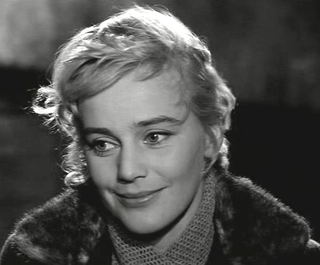
Maria Margarethe Anna Schell was an Austrian-Swiss actress. She was one of the leading stars of German cinema in the 1950s and 1960s. In 1954, she was awarded the Cannes Best Actress Award for her performance in Helmut Käutner's war drama The Last Bridge, and in 1956, she won the Volpi Cup for Best Actress at the Venice Film Festival for Gervaise.

Catherine Schell is a Hungarian-born British actress who came to prominence in British film and television productions from the 1960s. Her notable roles include the Bond girl Nancy in On Her Majesty's Secret Service (1969), Lady Claudine Litton in The Return of the Pink Panther (1975), Countess Scarlioni in the Doctor Who serial City of Death (1979), and a regular role as Maya in Year Two of the television series Space: 1999 (1976-1977).

Josef Emanuel Hubertus "Sepp" Piontek is a German former football player and manager.

The Odessa File is a 1974 thriller film, adapted from the 1972 novel of the same name by Frederick Forsyth, about a reporter's investigation into the ODESSA: an organisation set up to protect former members of the SS in post-Second World War West Germany. The film stars Jon Voight, Mary Tamm, Maximilian Schell and Maria Schell and was directed by Ronald Neame, with a score by Andrew Lloyd Webber. It was the only film that the Schell siblings made together.

Die Ratten is a 1955 West German drama film directed by Robert Siodmak. It is an adaptation of the 1911 play The Rats by Gerhart Hauptmann, but sets the story in the early 1950s, shortly after the Second World War.

The Last Bridge is a 1954 Austrian-Yugoslavian war drama film directed by Helmut Käutner and starring Maria Schell, Bernhard Wicki and Barbara Rütting. The film was entered into the 1954 Cannes Film Festival.

As Long as You're Near Me is a 1953 West German drama film directed by Harald Braun and starring Maria Schell and O.W. Fischer and Hardy Krüger. It was shot at the Bavaria Studios in Munich. The film's sets were designed by the art director Walter Haag. It was entered into the 1954 Cannes Film Festival.

Rose Bernd is a 1957 German drama film directed by Wolfgang Staudte. It was adapted from the play of the same name by Gerhart Hauptmann and was entered into the 1957 Cannes Film Festival. It was shot at the Bavaria Studios in Munich. The film's sets were designed by the art directors Hans Berthel and Robert Stratil.
"In Heaven There Is No Beer" is a polka song about the existential pleasures of beer drinking. The title of the song states a reason for drinking beer while you are still alive. The song in German is "Im Himmel gibt's kein Bier", in Spanish, "En El Cielo No Hay Cerveza". It was originally composed as a movie score for the film Die Fischerin vom Bodensee, 1956, by Ernst Neubach and Ralph Maria Siegel. The English lyrics are credited to Art Walunas.
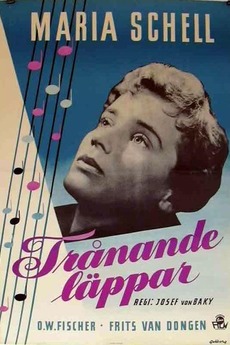
Dreaming Lips is a 1953 German drama film directed by Josef von Báky and starring Maria Schell, O. W. Fischer and Philip Dorn. It was shot at the Wandsbek Studios and on location around Hamburg. The film's sets were designed by the art directors Emil Hasler and Peter Röhrig. It is a remake of the 1932 film Dreaming Lips by Paul Czinner. Czinner had also remade the film in Britain in 1937.

After the Storm is a 1948 drama film directed by Gustav Ucicky and starring Maria Schell. It was made as a co-production between Austria, Switzerland and Liechtenstein, based on a novella by Carl Zuckmayer. Shooting took place at the Bellerive Studios in Zürich and on location in Ascona, Salzburg and Monte San Salvatore in Ticino. The film's sets were designed by the art directors Robert Furrer and Otto Niedermoser.
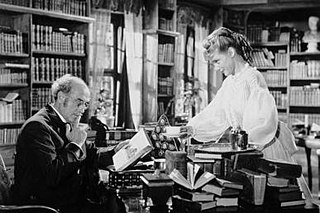
A Day Will Come is a 1950 West German historical drama film directed by Rudolf Jugert and starring Dieter Borsche, Maria Schell and Lil Dagover. It was shot at the Göttingen Studios. The film's sets were designed by the art director Walter Haag. It is based on Ernst Penzoldt's novella Korporal Mombour, set at the time of the Franco-Prussian War.

Diary of a Married Woman is a 1953 West German comedy film directed by Josef von Báky and starring Maria Schell, O. W. Fischer and Margarete Haagen.

The Bloody Judge is a 1970 horror film directed by Jesús Franco and written by Enrico Colombo, Jesús Franco, Michael Haller, and Anthony Scott Veitch. The film stars Christopher Lee, Maria Schell, Leo Genn, Hans Hass Jr., Maria Rohm and Margaret Lee. The film was released in Italy on February 5, 1970.

A Heart Returns Home is a 1956 West German musical drama film directed by Eugen York and starring Maximilian Schell, Willy Birgel and Maria Holst. It was shot at the Wandsbek Studios in Hamburg and on location in Celle. The film's sets were designed by the art directors Albrecht Becker and Herbert Kirchhoff.
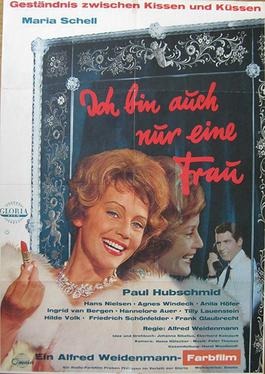
Only a Woman is a 1962 West German romantic comedy film directed by Alfred Weidenmann and starring Maria Schell, Paul Hubschmid and Hans Nielsen.
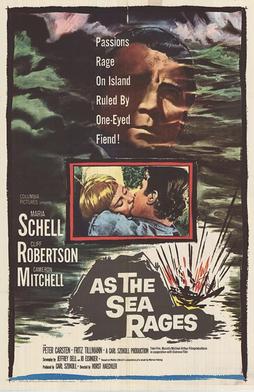
As the Sea Rages is a 1959 drama film directed by Horst Hächler and starring Maria Schell, Cliff Robertson and Cameron Mitchell. It is based on Werner Helwig's novel Raubfischer in Hellas. It was shot on location on the Dalmatian Coast. The film's sets were designed by the art directors Hertha Hareiter and Otto Pischinger
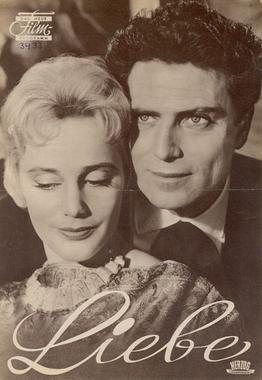
Love is a 1956 West German-Italian drama film directed by Horst Hächler and starring Maria Schell, Raf Vallone and Eva Kotthaus. It is an adaptation of the 1951 novel Vor Rehen wird gewarnt by Vicki Baum.

Master of Life and Death is a 1955 West German drama film directed by Victor Vicas and starring Maria Schell, Ivan Desny and Wilhelm Borchert. It was shot at the Spandau Studios in West Berlin and on location around the city and in Brittany. The film's sets were designed by the art directors Hans Ledersteger and Ernst Richter. It is based on the 1938 novel of the same title by Carl Zuckmayer.
References
- ↑ "IMDB.com: Awards for The First Polka". imdb.com. Retrieved 14 August 2010.